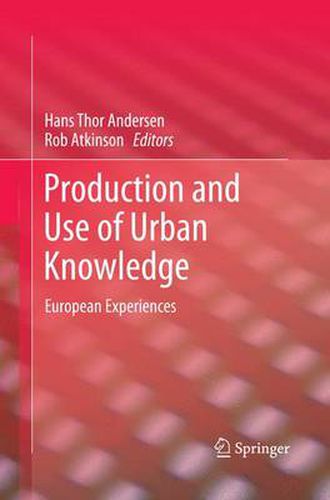Readings Newsletter
Become a Readings Member to make your shopping experience even easier.
Sign in or sign up for free!
You’re not far away from qualifying for FREE standard shipping within Australia
You’ve qualified for FREE standard shipping within Australia
The cart is loading…






This title is printed to order. This book may have been self-published. If so, we cannot guarantee the quality of the content. In the main most books will have gone through the editing process however some may not. We therefore suggest that you be aware of this before ordering this book. If in doubt check either the author or publisher’s details as we are unable to accept any returns unless they are faulty. Please contact us if you have any questions.
This book provides new insights on cities and the nature of urban development, and the role of knowledge management in urban growth. It considers how knowledge informs policies and supports decision making, and can assist in addressing the drivers of urban change. The way that knowledge is produced and used in urban development is analysed, with examples drawn from a range of European countries.
This book illustrates how the development and implementation of policies for urban areas can draw on knowledge management, even as the knowledge economy itself stimulates the evolution of the city as a place of innovation and creativity. Whilst knowledge grows in importance, so do urban issues, particularly in economic and political contexts at both European and national levels.
These essays explore growth in the range of knowledge available in urban contexts, the ways to generate new knowledge from a wide range of stakeholders, and how these can make an effective contribution to decision making processes in urban development.
The attractiveness of cities and surrounding areas to knowledge based forms of industry and investment and the competitiveness and performance of cities are a matter of major concern for national governments. In a sense it has become too important to leave to city politicians, and it is a topic requiring sustained reflection. This book gives the reader a detailed understanding of the issues involved and prompts further reflections.
$9.00 standard shipping within Australia
FREE standard shipping within Australia for orders over $100.00
Express & International shipping calculated at checkout
This title is printed to order. This book may have been self-published. If so, we cannot guarantee the quality of the content. In the main most books will have gone through the editing process however some may not. We therefore suggest that you be aware of this before ordering this book. If in doubt check either the author or publisher’s details as we are unable to accept any returns unless they are faulty. Please contact us if you have any questions.
This book provides new insights on cities and the nature of urban development, and the role of knowledge management in urban growth. It considers how knowledge informs policies and supports decision making, and can assist in addressing the drivers of urban change. The way that knowledge is produced and used in urban development is analysed, with examples drawn from a range of European countries.
This book illustrates how the development and implementation of policies for urban areas can draw on knowledge management, even as the knowledge economy itself stimulates the evolution of the city as a place of innovation and creativity. Whilst knowledge grows in importance, so do urban issues, particularly in economic and political contexts at both European and national levels.
These essays explore growth in the range of knowledge available in urban contexts, the ways to generate new knowledge from a wide range of stakeholders, and how these can make an effective contribution to decision making processes in urban development.
The attractiveness of cities and surrounding areas to knowledge based forms of industry and investment and the competitiveness and performance of cities are a matter of major concern for national governments. In a sense it has become too important to leave to city politicians, and it is a topic requiring sustained reflection. This book gives the reader a detailed understanding of the issues involved and prompts further reflections.